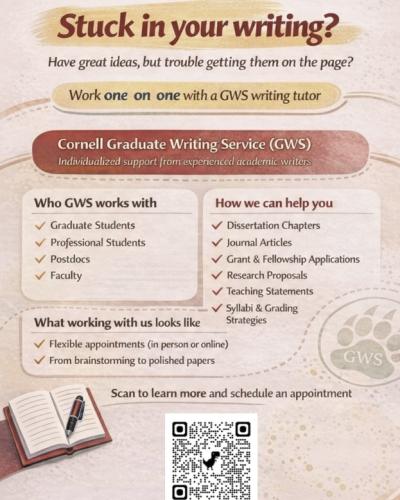I hope you’ll join me to celebrate the life of our precious community member, first-year student Shawn West, who passed away last week. Here is an excerpt about this wonderful young man from Saturday's Cornell Daily Sun article:
SHAWN WEST, a student in the College of Arts and Sciences, was from New York City. According to Cornell Vice President Ryan Lombardi, he was a promising young computer coder, who enjoyed developing video games, refurbishing vintage game consoles and was interested in the human impacts of technology and the relationships between users and devices. A resident of Ujamaa, a multi-year residential community for Black Cornellians, he was involved in several clubs and activities on campus, including the Office of Spirituality and Meaning-Making, the Skateboarding Club and Zen Meditation at Cornell. He also enjoyed photography and composing poetry on an old Royal typewriter.
Read more about Shawn West: First-Year Student Remembered as an ‘Engineer Poet’ and Compassionate Leader
Many of our students are grieving, particularly if they personally knew Shawn or have recently lost someone dear to them. I know that I am struggling to find ways to process my feelings of grief and sorrow. We have lost so many and so much this year.
Please think about the ways in which you might support your FWS students right now -- perhaps by excusing absences, extending deadlines, canceling or making optional assignments, or giving students time during class to conduct research or draft essays.
Campus-wide trauma-informed pedagogical responses like these, together with our compassion and flexibility can help lift students up and make it possible for them to successfully and more comfortably complete this ever-challenging semester.
Consider sharing with students, in an email or Canvas post, this document made by FWS student Katie Gorton. Her handout is a well-designed, two-page compilation of many of Cornell’s essential wellness resources: Cornell Wellness Resources Guide by Katie Gorton
If you feel that any of your students need additional support, please read for guidance the following repost from September 28, 2020 in which my colleague, FWS Director David Faulkner, offers advice on how to respond to students of concern.
Responding to Students of Concern (repost from 9.28.20)
Under normal conditions, FWS instructors often are in the best position to notice and respond to the signs of a student in distress: spotty attendance, subdued or evasive affect, obvious sleep deprivation, a sharp decline in the quality of work or contribution. Students are a little more likely to open up to an instructor who knows their name and sees them as an individual in a small, intimate seminar.
Pandemic conditions multiply the stressors; the online environment makes these signs harder to detect—Zoom flattens our intersubjectivity—and makes campus resources harder to access. In person, masks and distancing have similar effects.
There are no easy solutions, but here are a few starting points:
- Recognize that you are not alone, any more than is the student. None of us is obligated or even qualified to solve all students’ problems. We know that it is sometimes uncertain whom to contact. The answer is, anyone. Reach out to anyone for help: your adviser or course leader, your department chair, a member of the Knight Institute faculty. There are no inappropriate moves here. Follow this link to The Indispensable Reference for Teachers of First-Year Writing Seminars where we offer some protocols and procedures to follow if you notice a student who seems to be in trouble: Students of Concern: Protocols and Procedures.
- Contact Advising Deans sooner rather than later if a student continues to miss class sessions and deadlines. Advising deans can only direct students to support services and/or provide guidance about enrollment if they know what is going on. Keep the University drop deadline in mind. Students can drop courses up until April 5, 2021 to drop courses without a W appearing on their transcripts.
- Without other evidence or context, don’t automatically assume that a student who turns off video in Zoom meetings is in distress. (See separate posts here on “video on/off” policies.
- Reaching out regularly to students need not be either intrusive or overly time-consuming, and it’s just good pedagogy in online teaching. A quick e-mail check-in or a 10-minute Zoom meeting, on a personal rather than teacherly note, can provide insight to you and a lifeline for a student.
- If these invitations are refused or you sense deeper issues at stake, you will always find a sensible, reliable first resource in contacting the advising/student services office in the student’s college. If they are struggling in your seminar, they are likely struggling elsewhere (in larger, more impersonal classes), and it remains the case that you will have been the first to notice. The advising office is best positioned to see the larger picture and help the student holistically, with both academic and emotional support. You will find the student’s college listed in your course roster; the contact information for student services in each college can be found here: Students of Concern: College Contacts.
- You should also submit a confidential Student of Concern/Early Intervention Report. You can access this form from your Canvas Dashboard by selecting the ? at the bottom of the left bar menu. When the "Help" pop-up window appears, select "Students of Concern" at the bottom of the menu.
- Cornell Health has developed several online resources for instructors:
- A video titled "Notice and Respond: Assisting Students in Distress" presented Catherine Thrasher Carroll and Katherine Goldberg.
- A Canvas course for members of the Cornell community. The course takes approximately 30 minutes. To enroll, follow this link: Notice & Respond: Assisting Students in Distress.
- A companion course (10 minutes) can be found here: Cornell Health Overview Fall 2020 Edition. Together these short courses will orient you to the best approaches and resources available in the current environment.
- A quick reference guide to share with students (or post on your course Canvas site) is available here: Resources for Student Mental Wellbeing & Health.
As always, please do not hesitate to reach out to me, David Faulkner, at df259@cornell.edu, or to any member of the Knight Institute faculty.




